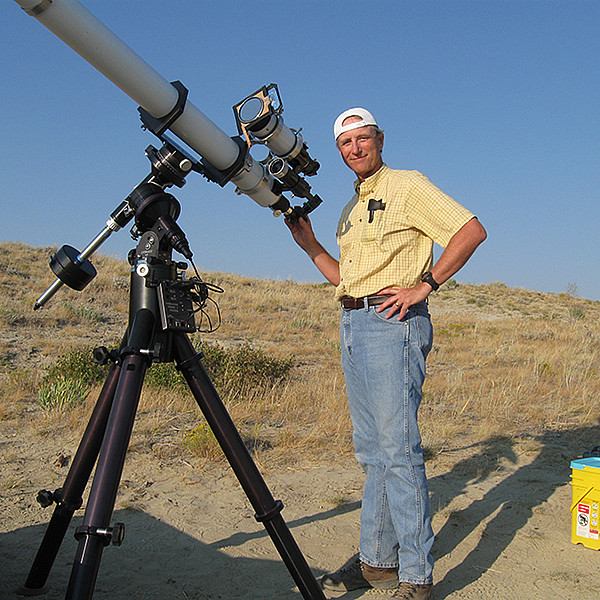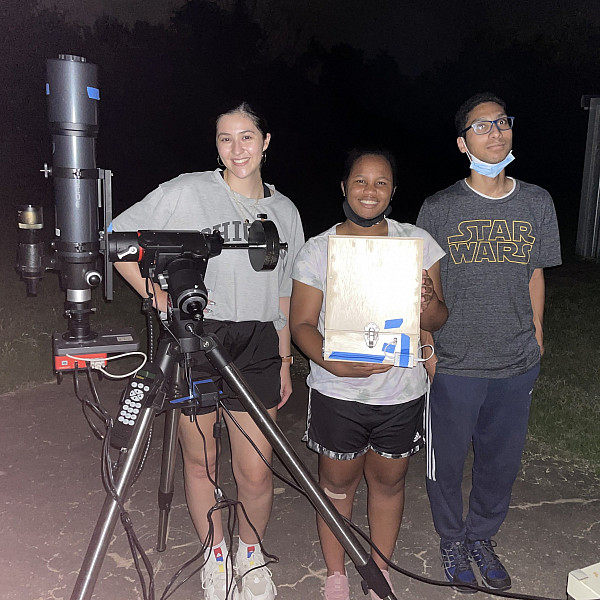News
From Southwestern to the Stars
An alumna’s journey to the depths of the universe.
June 14, 2023
June 14, 2023
Open gallery

When Taylor Hutchison ’16 first arrived at Southwestern, she had no idea that the path she had chosen would lead her to the furthest reaches of the universe. Hutchison began her first year as a physics major fueled by her passion for science and mathematics. During the spring semester, Associate Professor of Physics Mark Bottorff extended an offer that would alter the trajectory of her life.

“During this project, I was able to contribute data in publications, which isn’t common for undergrad students,” Hutchison recalled. “From there, I was hooked and kept studying astrophysics.”

Armed with a newfound purpose, Hutchison applied to graduate school. Little did she know that the interdisciplinary foundation she had built at Southwestern would become her guiding star on this journey. As she embarked on the application process, she drew upon the multifaceted perspective she cultivated at Southwestern, weaving together her passions to craft a compelling narrative that would captivate admissions committees.
“Southwestern was great training for my grad school application because I didn’t come from an esteemed research facility like other applicants,” Hutchison said. “Drawing on my experience with the King Creativity Fund and SCOPE research, my argument was the liberal arts experience is incredibly unique and makes you a powerful candidate because you’re multifaceted and trained to think outside the box.”
Texas A&M agreed and granted Hutchison a fellowship acceptance. During her six years of study, she was awarded the prestigious NSF Graduate Research Fellowship and continued her odyssey into the universe while specializing in studying distant galaxies. With the help of some of the most powerful telescopes on Earth, Hutchison has pushed the boundaries of exploration and continues to do so at NASA as a postdoctoral fellow.
“In my work, I’m trying to find the most distant galaxies, understand them, and see what stars they contain. Space is so vast, and the light from these distant galaxies takes 13 billion years to reach us, so we’re seeing images of an infant universe. Still, if we could teleport there, they may not even exist anymore,” Hutchison explained. “So we are also continuing to push the goalpost of how far back in time we have looked and what is the most distant galaxy. We keep pushing that goalpost, and we keep finding more and more distant galaxies.”
The research Hutchison and her colleagues conduct pushes the boundaries of physics, the knowledge of the universe, and our understanding of the natural world. However, Hutchison believes astronomy is the most approachable science because it is real-life science fiction that reignites our childlike wonder in our world and new discoveries. She says it is a beautiful way to promote curiosity and joy in people.
“I think there’s a reason why people continue to use Hubble Space Telescope images as computer backgrounds, bedsheets, or posters on the wall,” Hutchison remarked. “On the one hand, the technology we have developed to do this kind of science has other applications but also simultaneously improves humanity’s cultural evolution.”
Along with being at the forefront of technological advances and new understandings of the universe, Hutchison values mentorship and finds ways to give back to her community and uplift others looking to study astrophysics. She believes the service she provides to her community should be equally important as the science she accomplishes. Hutchison credits her mentors with assisting her throughout her education from Southwestern to her Ph.D. program. She says she always thinks of Southwestern when given access to valuable resources. Without Bottorff, she would have never seen graduate school as a feasible possibility, so she wants to give back to help others in the position she was once in.
“I created a resource website that is a guide for getting jobs in astronomy. Essentially, it is a timeline of what an applicant can expect and a how-to for applying for jobs,” Hutchison said. “There are so many people that want to do science and do valuable science, and I want to make that as equitable of a process as possible.”
Hutchison’s journey through her liberal arts education at Southwestern honed her ability to convey scientific theories and astronomical discoveries to a diverse audience. The writing-intensive courses she undertook equipped her with the ability to communicate complex concepts with precision and allowed her to bridge the gap between the scientific community and a wider audience, illuminating the wonders of the universe for anyone to understand.
She is grateful to her alma mater and credits the University with instilling the skills that have propelled her to success in her field, driven by a passion for lifelong learning. Hutchison encourages current students to sharpen their writing skills, nurture their curiosity, and fearlessly seek answers. With her words as a guiding light, Hutchison paves the way for aspiring scholars to delve into the marvels of the cosmos and embark on their own journeys of knowledge and discovery.

If you have questions about supporting the initiatives mentioned in the article, please call the Development Office at 512-863-1211. For more information about other priority initiatives at Southwestern, visit thrive.southwestern.edu.




















